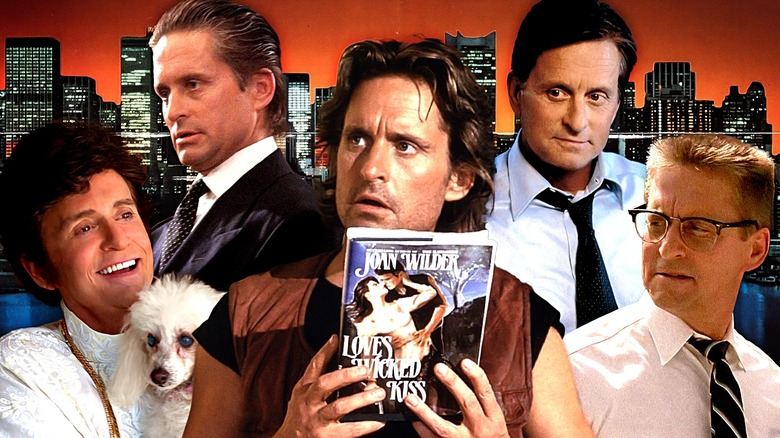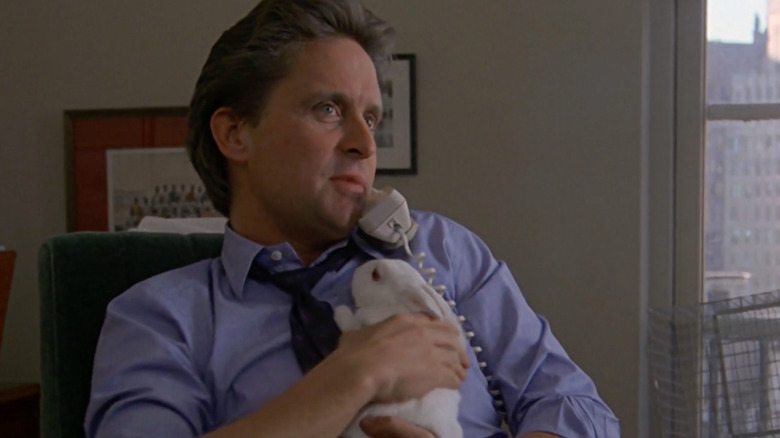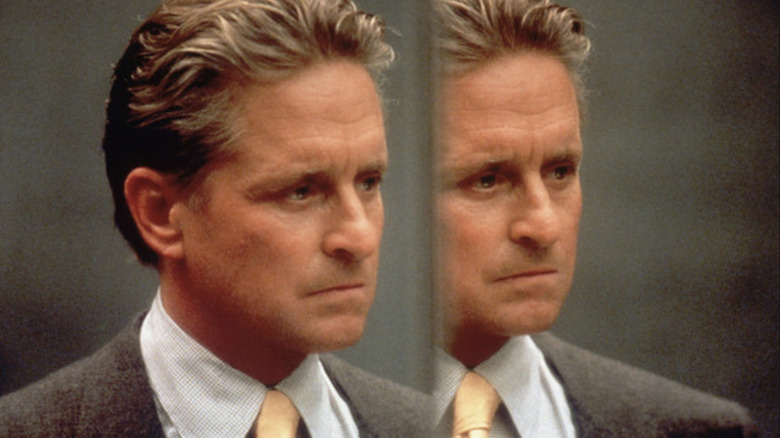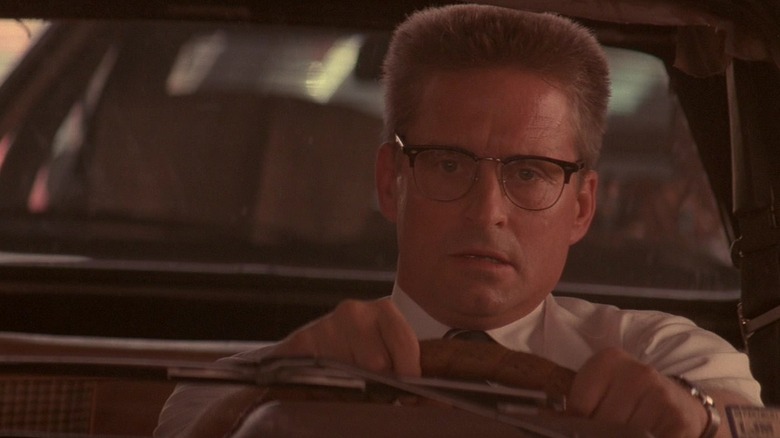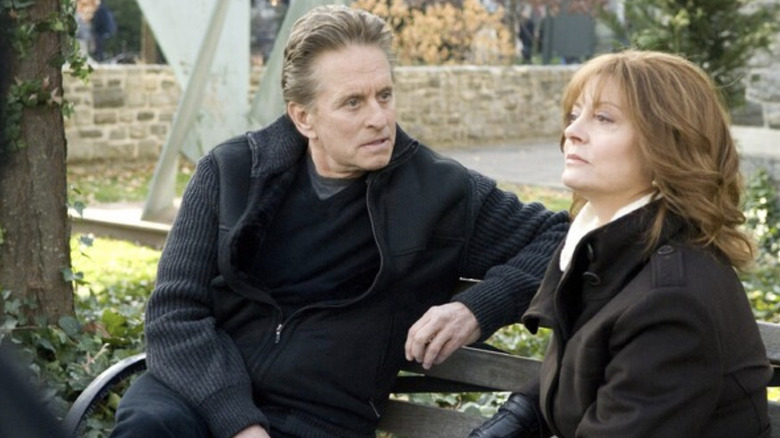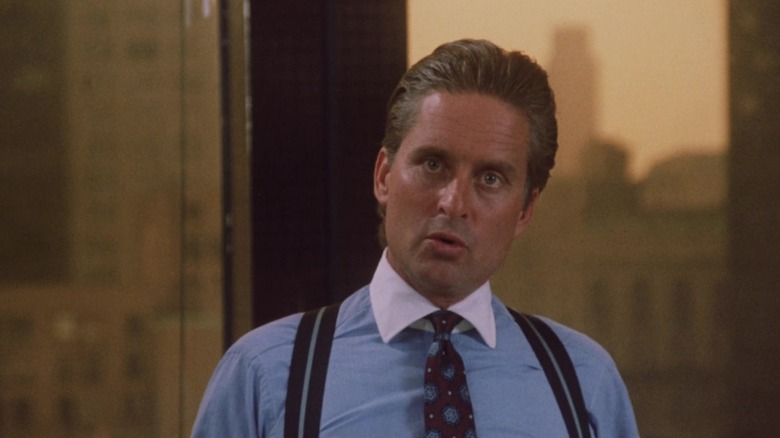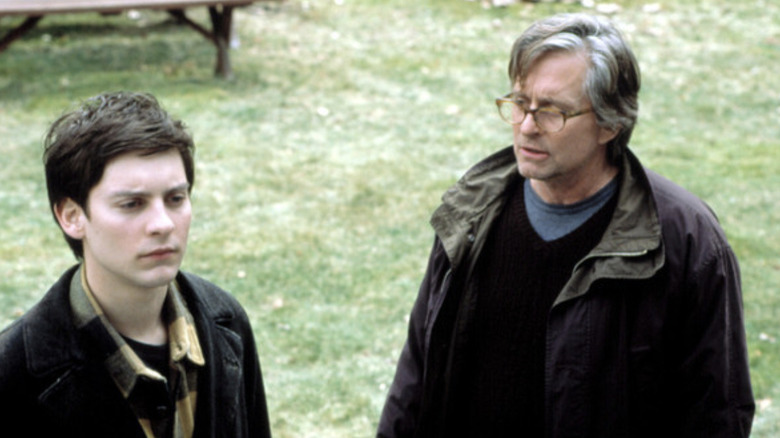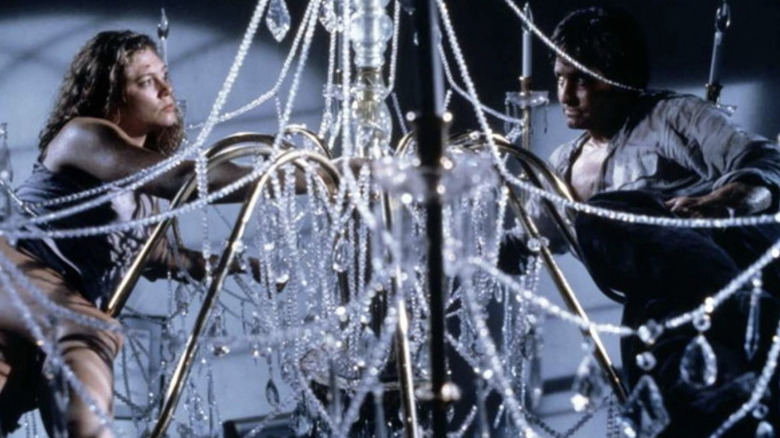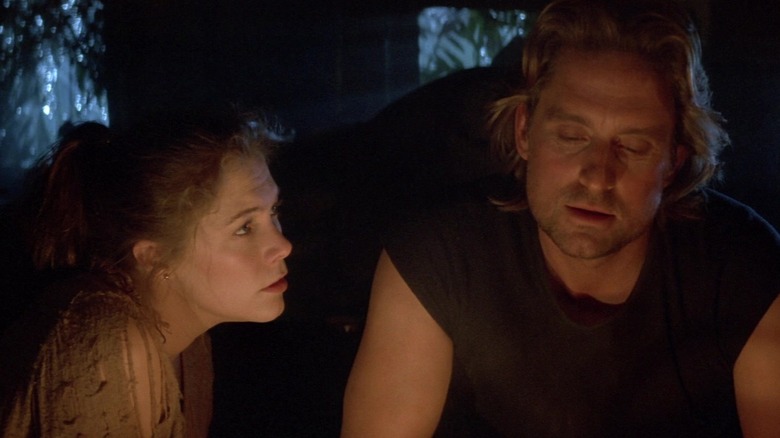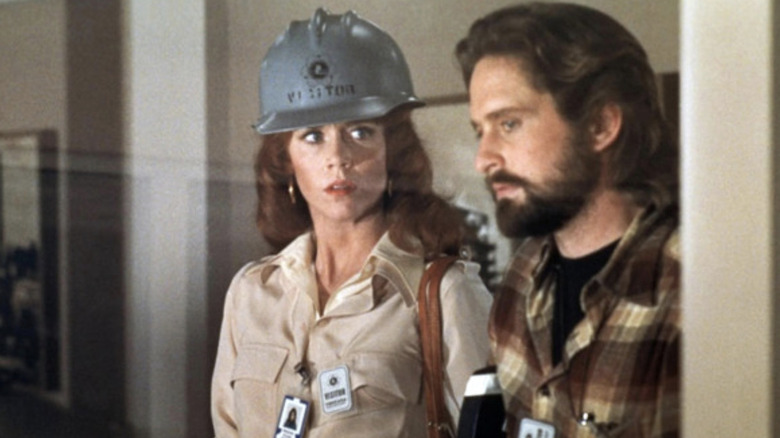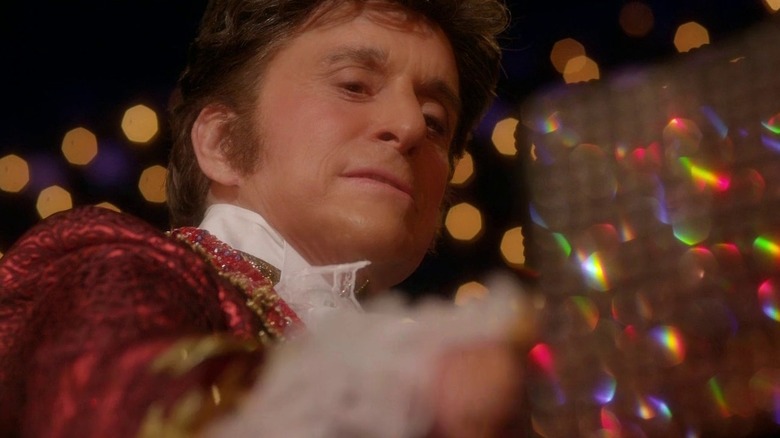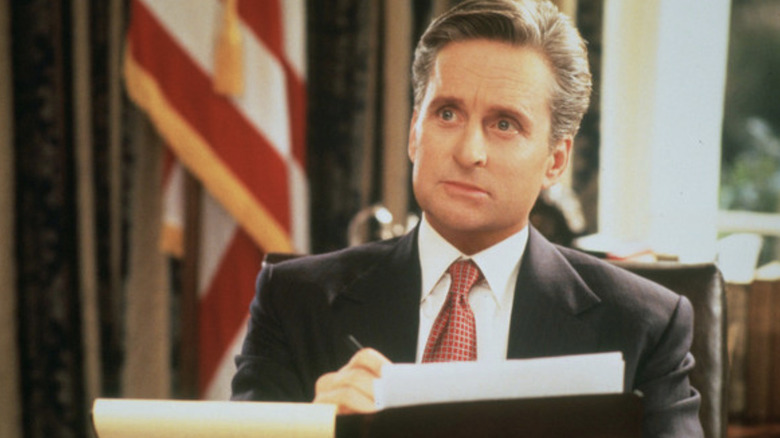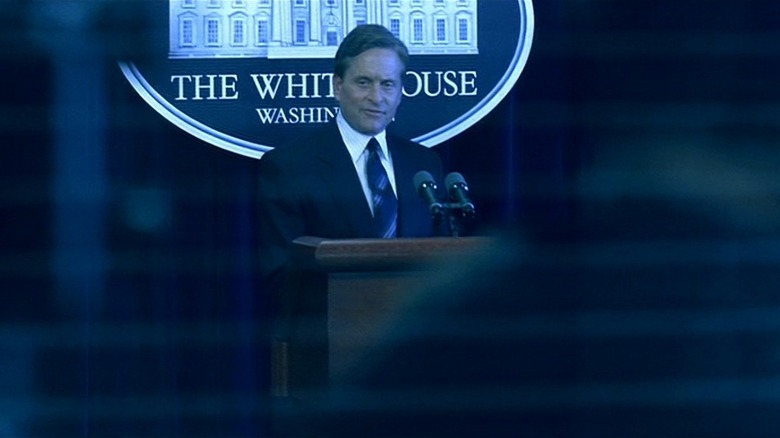12 Best Michael Douglas Movies, Ranked
Michael Kirk Douglas is the first of four sons born to Issur Danielovitch, who had already changed his name to the far more familiar Kirk Douglas. Yep, Michael Douglas can be considered a "nepo baby," whose famous father was a movie star for most of his life. Yet despite sharing the same last name and facial features as his old man, Douglas the son has carved a distinct path from Douglas the dad.
There's no disputing that Kirk launched Michael's career by helping him snag the rights to "One Flew Over the Cuckoo's Nest," which landed him a Best Picture Oscar. There's also no denying that Michael has crafted a half-century-plus career arguably even greater than his famous father, with earnings of almost $4.5 billion worldwide box office and a Best Actor Oscar (which Kirk never won). Let's just say Michael wasn't on the A-list for decades because moviegoers liked his dad; he got there because he's a darn good movie star.
Honestly, what Michael Douglas owes his dad most are his genes. Like his father before him, Douglas effortlessly slides from charming rogue to complete louse, creating heroes you love to root for, and villains you love to hate, sometimes in the same role. While he has quietly slowed down, he could have retired decades ago and still left behind a legendary career. Frankly, it was hard narrowing this list down, which means some movies you may expect didn't make the cut. Find out what lands on the list of Michael Douglas' 12 best movies.
12. Fatal Attraction
During almost every year of the 2010s, the highest-grossing movie was a franchise film. The past five years haven't been much different. Not so long ago, in the land of 1987, the highest-grossing movie was "Three Men & A Baby," followed closely by a film in which a scorned woman boils a little girl's pet bunny. It was a different time. A simpler time.
Michael Douglas starred in the latter, "Fatal Attraction," playing a hotshot New York lawyer with a loving wife (Anne Archer) and daughter, who succumbs to the call of the loins and has what he thinks is a casual fling with a seductive book editor (Glenn Close). Alas, she doesn't see things the same way, going from a "stage-five clinger" to a certifiable psychopath, including brutally boiling the aforementioned bunny.
Judging by the film's astounding box office (more than $440 million adjusted for inflation), "Fatal Attraction" hit its mark, discouraging many a married man nationwide from having extramarital affairs (which evidently their wedding vows didn't). Actually, "terrified" is more like it. "Fatal Attraction" is a "potboiler" (and not just for rabbits), guided by Douglas' steady hand as the shady protagonist, and Close's very unstable turn as the sympathetic villain, for which she justly earned an Oscar nom. While the makers of the TV remake insisted their take would be better, there's no improving upon the original. No rabbits were harmed during the making of "Fatal Attraction", but plenty of moviegoers were scared stiff.
11. The Game
David Fincher's filmography includes some of his generation's greatest gems like "Seven," "Fight Club," "Zodiac," "The Social Network," and his undisputed masterpiece, "Alien 3." Just kidding, though — "Alien 3" is underrated, even by its own director. Anyway, Fincher's fantastic filmography means some top-notch flicks get forgotten, one of which is "The Game" from 1997. Michael Douglas plays Nicholas Van Orton, a successful, if secluded, banker bent on building a life of wealth and nothing more. When Van Orton's estranged brother (Sean Penn) invites him to play a real-life game, he figures, "What's the harm?" But soon the game turns personal, and eventually becomes dangerous, and begins to burn down Van Orton's carefully crafted life piece by piece.
It's always cool when an edgy young director works with an established star, and equally exciting when said star trusts the storyteller to toy with his screen image. Though to be honest, Fincher knew exactly what he was doing by casting Douglas, as nobody was better at playing the cocksure guy who seemingly has it all together, but whose world quickly falls apart like a game of Jenga. Fincher is, of course, a master of mood and atmosphere, while Douglas keeps you invested in the story, no matter how outlandish "The Game" gets. While "The Game" is not brought up often in either Fincher or Douglas retrospectives, don't sleep on this superb suspense thriller.
10. Falling Down
"Falling Down" is ahead of its time, behind the times, or timeless, depending on your point of view. One thing that it is not is ignorable. Ironic, because that's exactly how its protagonist William Foster (Michael Douglas) feels: Unemployed, divorced, chewed up and spat out by life. When Foster's car breaks down in the middle of a Los Angeles traffic jam, he breaks down too (it can happen to the best of us), starting a day-long odyssey through the urban and moral decay of a modern metropolis that is part James Joyce and part Travis Bickle.
Most of Michael Douglas' movies have him playing the super-successful guy who has to save his life from unraveling. "Falling Down" finds him playing against type as a bitter man broken by life who wants to rebuild what little he has. There's a masterpiece hidden in "Falling Down," but unfortunately, director Joel Schumacher (two years before the overlooked "Batman Forever") doesn't quite find it. Unlike "Taxi Driver" or even "Joker," this 1993 film gets skittish about its subject matter, favoring a "popcorn-friendly take on its complex themes," according to the Rotten Tomatoes critics' consensus. Still, you can't help but feel for Foster, with Douglas creating one of the most "out-of-character" characters in his career.
9. Solitary Man
"Solitary Man" stars Michael Douglas as Ben Kalmen, the kind of guy people would say "how does he get away with it?" Well, this 2009 dramedy is about what happens when that kinda doesn't. Once a thriving, if shady, car dealer, Kalmen makes some bad decisions that put the brakes on his business. Meanwhile, his skirt-chasing ways cost him his marriage to his wife (Susan Sarandon) and put him on the outs with his girlfriend (Mary-Louise Parker). Watching the world he spent a lifetime building crumble, Kalmen thinks of something else for once and takes his daughter (Imogen Poots) on a tour of colleges in Boston. Alas, you can teach an old dog new tricks, but you can't always teach a dirty old man to change his ways.
"Solitary Man" boasts an all-star cast (also including Jesse Eisenberg and Danny DeVito), but this is Douglas' movie, as he wears the character like an cashmere cardigan sweater. What Douglas does best isn't just playing unscrupulous characters, but louses you can't help but like and even root for. This is certainly the case with "Solitary Man," which features one of his last great lead performances before the irresistible allure of fat Marvel paychecks lured him away.
8. Wall Street
Michael Douglas was nominated for two Oscars and won both, so he's two for two, an achievement I'm not sure anybody else has ever matched. The first was Best Picture as a producer for "One Flew Over The Cuckoo's Nest" in 1976; the next came 12 years later with Best Actor for "Wall Street." The year 1987 was a big one for Douglas, who starred in one of his biggest box office hits with "Fatal Attraction" and one of his greatest artistic triumphs in the aforementioned "Wall Street."
More pointedly, he also established the screen persona that carried him from the A-list to the A+ list. While he'd never really played "goody-two-shoes" types, his characters up to then were more morally ambiguous and cynical in the style of Humphrey Bogart. With these two films, he established himself as the undeniable dirtbag you hate to love. As Gordon Gekko, Douglas delivers the most famous line of his career (and one of the most memorable in movie history): "Greed, for lack of a better word, is good." While frequently misquoted as just "greed is good," some would say this line defined the decade — and probably won Douglas his Oscar. The movie it's in is pretty darn good too, with director Oliver Stone at his paranoid best, delivering a blunt denunciation of a decade's decadent obsession with avarice.
7. Wonder Boys
"Wonder Boys" finds Michael Douglas playing neither a high-achieving a-hole nor a total loser, but somewhere in between: A has-been. English professor Grady Tripp (Douglas) wrote a celebrated novel whose long-delayed sequel is spiraling out of control, just like his life. His wife has left him, the love of his life (Frances McDormand) is pregnant with his child ... and is also married to his boss, and his pesky editor (Robert Downey Jr.) has just flown into town to see if Grady has written anything worthwhile (he hasn't). Tripp's sole saving grace is meeting a talented, but troubled student (Tobey Maguire), whom he takes under his (broken) wing.
"Wonder Boys" was Curtis Hanson's follow-up to his 1997 triumph "L.A. Confidential," and while the former is a suspense noir ensemble, the latter is a comedic character study that at times feels as intimate as a play. It is especially enjoyable for moviegoers who like to watch great actors acting, and "Wonder Boys" boasts some of the best (Douglas, McDormand, Maguire, Downey Jr.) doing their thing. For a movie about a man who made a mess of his life, "Wonder Boys" tells its story pretty much perfectly.
6. The War of the Roses
Some cynics say there's a reason fairy tales end with "and they lived happily ever after." Well, 1989's "The War of the Roses" is about what happens after "happily ever after." The 1989 black comedy follows Oliver (Michael Douglas) and Barbara Rose (Kathleen Turner) as they fall madly in love, get married, start a family, build a beautiful life together ... and then are willing to do just about anything to get out of it. Cynics also say, "You never know somebody until you divorce them," and that is certainly the case here, as both Roses quite literally go to war over who gets to keep their magnificent home.
Stuck in the middle is their peacemaking attorney friend (Danny DeVito) and horrified children (Sean Astin, Heather Fairfield), proving that divorce is indeed hell for everyone involved, but can also be kinda funny in the right hands, yeah? Speaking of the right hands, DeVito also directs this film, which is one of his best, reuniting with his "Romancing the Stone" co-stars and guiding them to one of their respective career-best performances. Hoping for a happy ending? Look elsewhere. Seeking a first-class farce that displays DeVito's singularly sick sense of humor? You'll find it with "The War of the Roses."
5. Romancing the Stone
Robert Zemeckis directed some absolute bangers, but besides those starring Tom Hanks or produced by Steven Spielberg, I'd say his best is probably "Romancing the Stone." Michael Douglas plays Jack T. Colton, a mercenary rogue straight out of one of the romance paperbacks written by the timorous Joan Wilder (Kathleen Turner). Turns out, he's her only hope to rescue her sister, who has been abducted and absconded to the Colombian jungle in exchange for a treasure map. As you might imagine from a mercenary, Colton won't stick his neck out for anyone, but is willing to make an exception for Wilder ... or rather, the treasure she's seeking.
"Romancing the Stone" is as fun to watch as it must have been to make, and is the first of three films Douglas filmed with his best leading lady, Kathleen Turner. The setup for "Romancing The Stone" couldn't have been simpler ("romance-adventure novelist finds herself in a real-life adventure"), and succeeds due to Zemeckis' dynamic direction, and especially the captivating charisma and chemistry of its leads. As so often happens, "Romancing the Stone" inspired a far inferior and much less successful sequel, "The Jewel of the Nile," the very next year, but the 1984 original is where it's at.
4. The China Syndrome
The 1986 Chernobyl meltdown showed the dark side of nuclear power when "regulated" by an incompetent and corrupt regime. "The China Syndrome" predicted that disaster by seven years, while also coinciding with the Three Mile Island partial meltdown that happened that same year in 1979. By the late 1970s, Michael Douglas was already an Oscar winner as producer of "One Flew Over The Cuckoo's Nest," but as an actor, he was best known for playing opposite Karl Malden on "The Streets of San Francisco" for five seasons on ABC.
"The China Syndrome" was Douglas' first big hit as a movie actor, though it helped that he was playing backup to Hollywood heavyweights Jane Fonda and Jack Lemmon. Douglas plays the cameraman to Fonda's TV news reporter, who is trying to help the plant supervisor (Lemmon) alert the public that the California plant is in violation of safety standards before a meltdown turns the City of Angels into a graveyard. "The China Syndrome" proved the power of culture to shape policy, striking a nerve with the public and making the "China Syndrome" term (as in "melting through the Earth to China") mainstream. The film remains a tense, thinking man's thriller nearly five decades since its release, displaying that Douglas was a new clear (see what I did there?) star in the making.
3. Behind The Candelabra
"Behind The Candelabra" is not the kind of movie that an aging movie star with an established screen persona makes, which is why Michael Douglas' work in the 2013 film is such a marvel (unlike his work in Marvel). Released on HBO in 2013, Douglas stars as the world-famous piano player and consummate performer Liberace, who rose to fame in the 1950s on the strength of his singular showmanship. It's basically about as far from any character Douglas had ever played ever. "Behind The Candelabra" showcases Liberace in his not-so-golden years, following the mercurial musician's relationship with a much-younger man (Matt Damon) who starts taking drugs while the musician takes on new lovers on the side.
Even the name "Behind The Candelabra" screams cheesy, made-for-TV movie, but the amazing thing is that it's not. This is an A-list production, as besides Douglas and Damon, the cast includes Dan Aykroyd and Rob Lowe, while Academy Award-winning Steven Soderbergh directed the film – guess he's a Liberace fan? Playing Liberace could have easily descended into caricature, especially given that his persona basically was a caricature. Douglas' performance dives deeper than that, fleshing out the flamboyant entertainer in a late-career performance that is both his bravest and one of his best.
2. The American President
"The American President" was essentially screenwriter Aaron Sorkin's cinematic proving ground for what would become TV's "The West Wing" four years later. This time, commander-in-chief duties fall to Michael Douglas as President Andrew Shepherd, every bit the Sorkin wish fulfillment that President Jed Bartlet would one day become.
Besides being the leader of the free world, President Shepherd faces the challenges of running for reelection, raising a daughter, and courting a lobbyist (Annette Bening). But when it looks like the widowed father's second chance at love could cost him a second term, he finds himself having to choose between reelection and romance. Okay, so it sounds a bit cute, and naturally gets wrapped up in a neat and tidy bow. But like Frank Capra did decades before in classic films that the makers of "The American President" clearly adore, this movie works.
To paraphrase Roger Ebert in his four-star review, "The American President" manages the impressive bordering on impossible feat of being a good love story, comedy, and smart satire about politics. To which I would add that it mostly avoids the far more challenging task of skipping Sorkin's stereotypical smug sanctimony ... mostly. But the only way for a movie like this to work is if you want to root for (and maybe vote for) the guy playing the President. Douglas more than delivers, creating a Commander In Chief who belongs on the same list as Presidents Whitmore ("Independence Day") and Marshall ("Air Force One") for "favorite fictional movie Presidents."
1. Traffic
Ironic that for a movie star who built a decades-long career as an A-list leading man that Michael Douglas' best movie would be an ensemble. Also ironic (in the Alanis Morissette sense) is that Douglas turned down the film, which was then offered to Harrison Ford, who also turned it down, only for Douglas to finally join the massive cast. I guarantee he's glad that he did.
Director Steven Soderbergh sets for himself the ambitious task of tackling America's complicated war on drugs by telling the stories of multiple interconnected people. Sounds dicey, but this is Soderbergh we're talking about, who justly won Best Director, though Best Picture went to "Gladiator." Douglas plays Ohio Supreme Court justice Robert Wakefield, whom the President appoints to lead the nation's drug war. This hits close to home for Judge Wakefield when his own daughter (Erika Christensen) becomes addicted to cocaine and heroin. Benicio Del Toro gives the standout performance in "Traffic," which rightly won him an Academy Award for Best Supporting Actor. But what Douglas delivers is the credibility he spent decades building as a movie star, and he brings to his character an authoritative man whose own world is crumbling behind the scenes. It isn't a scene-stealing performance, but it is an essential one, and helps make "Traffic" the best movie of Michael Douglas' acting career.
